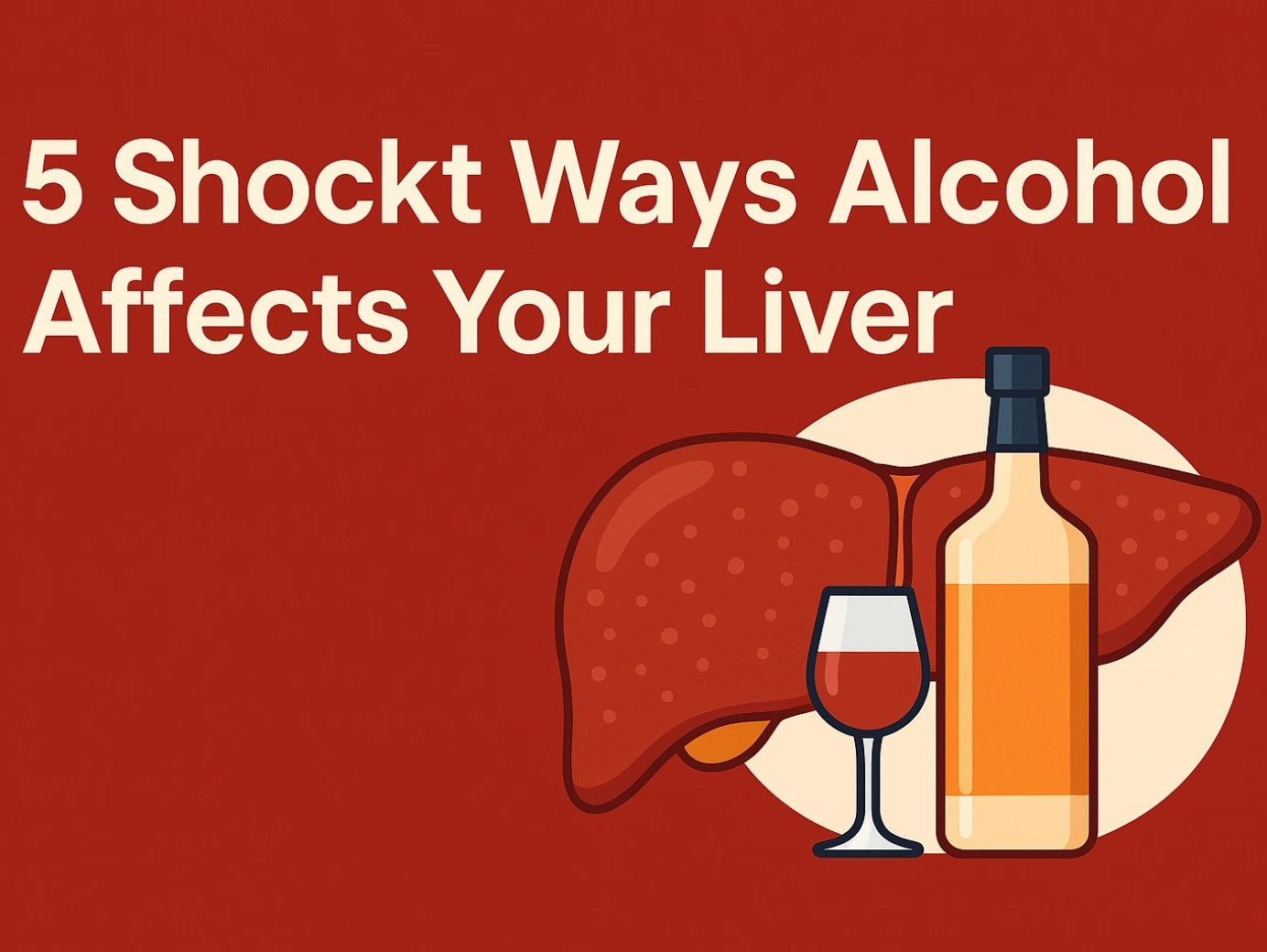5 Shocking Ways Alcohol Affects Your Liver

Introduction
Alcohol is often considered a part of social life, but many underestimate its effects on the liver. Understanding alcohol effects on liver is crucial for protecting your overall health and avoiding long-term complications. The liver is the primary organ responsible for processing alcohol, and excessive intake can lead to conditions ranging from fatty liver to life-threatening cirrhosis and even liver cancer.
The consequences of alcohol abuse extend beyond physical discomfort; they can impact your energy levels, immunity, and long-term organ health. This article explores 5 shocking ways alcohol affects your liver, provides practical liver health tips, and shares effective strategies to prevent liver damage from alcohol. Following these expert recommendations can help maintain optimal liver function, prevent alcohol-related liver problems, and improve your overall quality of life.
1. Fatty Liver from Alcohol
One of the earliest signs of liver damage is fat accumulation in liver cells, known as fatty liver. Even moderate alcohol intake can trigger this condition over time. Fatty liver is often asymptomatic, but if left unaddressed, it can progress to inflammation, scarring, or more severe liver disorders.
Tips to prevent fatty liver:
- Limit alcohol consumption and avoid binge drinking.
- Incorporate a kidney- and liver-friendly diet rich in vegetables, fruits, and whole grains.
- Follow healthy liver habits, such as staying hydrated and exercising regularly.
- Consult the Diet & Nutrition Experts at Vengataeswara Hospital for a personalized nutrition plan.
Recognizing the early signs of fatty liver is essential for prevention. Regular liver function tests can help detect fat accumulation before irreversible damage occurs.
2. Alcoholic Hepatitis Symptoms
Chronic alcohol consumption can cause alcoholic hepatitis, a serious inflammatory condition of the liver. This condition can be mild or severe and may become life-threatening if left untreated.
Common alcoholic hepatitis symptoms include:
- Jaundice (yellowing of skin and eyes)
- Abdominal pain and swelling
- Fatigue, nausea, and loss of appetite
Preventing alcoholic hepatitis requires moderation and awareness. Regular check-ups can help detect liver inflammation early, and following alcohol and liver disease prevention strategies can reduce risk.
Alcoholic hepatitis can sometimes progress to cirrhosis if alcohol abuse continues. Early intervention and lifestyle changes are key to reversing damage and maintaining liver health.
3. Cirrhosis Due to Alcohol
Cirrhosis occurs when healthy liver tissue is replaced with scar tissue, reducing liver functionality. Chronic alcohol abuse is a major contributor to cirrhosis. This condition can lead to severe complications, including liver failure.
Signs of cirrhosis due to alcohol:
- Swelling in legs and abdomen
- Easy bruising or bleeding
- Fatigue and digestive issues
Preventive measures include avoiding binge drinking, eating a liver-friendly diet, and regular monitoring. Our Gastroenterology & Hepatology Specialists offer comprehensive care to detect early cirrhosis and manage liver health effectively.
Cirrhosis can sometimes develop silently, which is why routine liver screenings are essential, especially for individuals with a history of heavy alcohol consumption.
4. Increased Risk of Liver Cancer
Long-term alcohol consumption significantly increases the risk of liver cancer, especially in individuals with pre-existing liver damage. The progression from fatty liver and hepatitis to cancer emphasizes the importance of early prevention and intervention.
Preventive tips include:
- Regular liver screenings and diagnostic tests
- Limiting or eliminating alcohol consumption
- Adopting healthy liver habits, including regular exercise and proper hydration
For advanced monitoring and preventive care, visit the Liver Care Clinic at Vengataeswara Hospital to receive professional guidance and support.
5. Impaired Liver Detox from Alcohol
The liver has a natural ability to regenerate and detoxify the body, but alcohol interferes with this vital process. Continuous alcohol exposure slows recovery from liver injury and increases vulnerability to further damage.
Ways to support liver detox and maintain liver health:
- Abstain or limit alcohol intake
- Eat a nutrient-rich diet with fruits, vegetables, and whole grains
- Stay hydrated and exercise regularly
- Follow expert liver detox and wellness tips
Supporting liver regeneration through healthy habits can dramatically reduce the risk of serious conditions and improve overall metabolic health.
Conclusion
Alcohol can have shocking effects on your liver, from fatty liver to cirrhosis and liver cancer. Early intervention, moderation, and lifestyle changes are essential to maintaining long-term liver health. By implementing liver health tips, following preventive strategies, and consulting medical experts, you can avoid alcohol-related liver problems. At Vengataeswara Hospital, our team provides comprehensive care, screening, and personalized guidance to ensure your liver stays healthy. Take action today and schedule a consultation at Vengataeswara Hospital.
Frequently Asked Questions
1. How does alcohol affect the liver?
Alcohol disrupts normal liver function, causing fat accumulation, inflammation, scarring, and increasing the risk of liver disease.
2. What organ does alcohol affect the most?
The liver is primarily affected, although alcohol can also damage the heart, pancreas, and brain with prolonged use.
3. Can liver damage from alcohol be reversed?
Early-stage damage like fatty liver can improve with lifestyle changes, abstinence, and proper medical guidance.
4. What are the early signs of liver damage?
Symptoms include jaundice, fatigue, abdominal pain, nausea, and loss of appetite.
5. How can I prevent liver damage from alcohol?
Limit alcohol intake, maintain a balanced diet, exercise regularly, stay hydrated, and consult medical professionals for monitoring.



